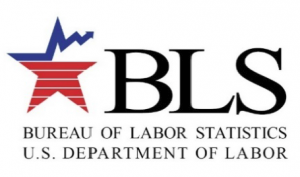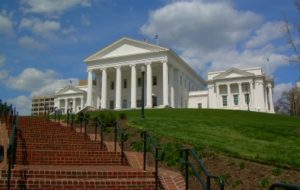The Score: Immigration Policy, Jobs Growth, More Highlights
This week on The Score – Why does immigration policy reform seem so impossible? What did we learn from the latest Labor Department jobs report? We visit some highlights from 2018, including interviews with authors and Virginia state legislators.
Another Brick in the Wall
 As this episode of The Score goes out over the air waves, the federal government is three weeks into a partial shutdown, sparked by an impasse between the President and Congress over spending billions of dollars on a Wall on the border with Mexico.
As this episode of The Score goes out over the air waves, the federal government is three weeks into a partial shutdown, sparked by an impasse between the President and Congress over spending billions of dollars on a Wall on the border with Mexico.
The day after President Trump’s Oval Office address on the “crisis” at the border, I spoke with David Bier, an immigration policy analyst at the Cato Institute in Washington, about U.S. immigration policy and the contradictions that pull legislators left, right, up, and down as they fight for new ways to refuse to compromise.
From 2013 to 2015, Bier drafted immigration legislation as senior policy advisor for Congressman Raúl Labrador. He has also worked as the immigration policy analyst at the Competitive Enterprise Institute and also as the director of immigration policy at the Niskanen Center. Last month he published a report for Cato called “How Legalizing Marijuana Is Securing the Border: The Border Wall, Drug Smuggling, and Lessons for Immigration Policy.” The New York Daily News carried his op-ed, “Trump Just Doesn’t Understand the Border: Here Are the Facts,” on January 10. He is on Twitter as @David_J_Bier.
Employment Statistics
 Last week the Bureau of Labor Statistics issued its monthly report on jobs and employment. The December report showed an addition of over three hundred thousand new jobs. At the same time, it showed unemployment rising. How can this be happening at the same time?
Last week the Bureau of Labor Statistics issued its monthly report on jobs and employment. The December report showed an addition of over three hundred thousand new jobs. At the same time, it showed unemployment rising. How can this be happening at the same time?
I asked Michael Farren, an economist at the Mercatus Center at George Mason University, to explain the Labor Department’s jobs report. We spoke by telephone on January 4. (Part of his answer is in this piece he wrote for The Bridge that same day.)
Farren’s research and commentary have been featured in numerous media outlets, including the Washington Post, Los Angeles Times, Newsday, Miami Herald, Dallas Morning News, and NPR. He blogs about economics and economic policy at Concentrated Benefits. He previously appeared on The Score to discuss Amazon’s decision to locate part of its HQ2 in Northern Virginia. Follow his Twitter feed at @MichaelDFarren.
2018 Highlights: General Assembly
 This week, the Virginia General Assembly started its 400th annual session. That’s right: the legislature began meeting regularly in 1619.
This week, the Virginia General Assembly started its 400th annual session. That’s right: the legislature began meeting regularly in 1619.
Last year I talked to several members of both the House of Delegates and the state Senate about legislation and politics. Here are some excerpts, beginning with state Senator Creigh Deeds, who back in April correctly predicted that Democrats would pick up three congressional seats in the November elections. He and then-Minority Leader David Toscano both offered their thoughts about Democrats electoral prospects after a townhall meeting at Monticello High School.
Deeds and Toscano are followed in this sequence by Delegate Nick Freitas, Delegate Steve Landes, Senator Mark Obenshain, Senator Bryce Reeves, and Delegate Rob Bell, with Senator Deeds wrapping things up with some comments on the prospect of gambling legislation in this year’s session.
2018 Highlights: Author Interviews
Over the past year, I had the opportunity to talk to a number of authors on a wide range of topics. We had clips from some of those authors last week and here are some more, beginning with Emily Dufton explaining the difference between decriminalization and legalization of marijuana.
The other voices are John Farrell on Richard Nixon, Garrett Peck on the home front in World War I (with his new book reviewed in Sunday’s Washington Post), Hawes Spencer on Charlottesville’s “Summer of Hate,” Randal O’Toole on rail transit, Jonathan Rauch on The Happiness Curve, Michael Tanner on The Inclusive Economy, with Sharon Weinberger talking about the Defense Advanced Research Projects Agency, or DARPA, batting clean-up.
From the Archives
 Almost nine years ago, I had a chance to speak to transportation expert Wendell Cox about high-speed rail after he gave a presentation at the Heritage Foundation. Cox is author of War on the Dream: How Anti-Sprawl Policy Threatens the Quality of Life (2006) and co-author (with Richard Vedder) of The Wal-Mart Revolution: How Big-Box Stores Benefit Consumers, Workers, and the Economy (also 2006).
Almost nine years ago, I had a chance to speak to transportation expert Wendell Cox about high-speed rail after he gave a presentation at the Heritage Foundation. Cox is author of War on the Dream: How Anti-Sprawl Policy Threatens the Quality of Life (2006) and co-author (with Richard Vedder) of The Wal-Mart Revolution: How Big-Box Stores Benefit Consumers, Workers, and the Economy (also 2006).
“The push toward high speed rail has considerable problems,” he told me. “One of them is that most of what is being proposed isn’t even high speed rail, it’s really very slow rail, comparatively speaking.”
Paradoxically, as more high speed rail lines are added across the United States, road congestion will get worse rather than better. Cox explained why.
“A lot of the systems that are being proposed would put new passenger trains on existing freight rail,” he pointed out. “That will make it more difficult for the freight rail systems to operate efficiently.”
Transportation is a perennial subject of discussion and legislation so this week’s featured interview from the archives is Wendell Cox .
Be sure to come back next week for more news, reviews, and interviews. Don’t forget to tell your friends about The Score, and be sure to leave your comments, below, along with suggestions for topics or people to interview.


